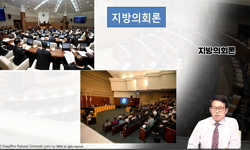The issue of party involvement in local elections depends on its political role in compositions and activities of local government. Until recent, however, the negative views on party involvement in local elections have prevailed due to moral hazards p...
http://chineseinput.net/에서 pinyin(병음)방식으로 중국어를 변환할 수 있습니다.
변환된 중국어를 복사하여 사용하시면 됩니다.
- 中文 을 입력하시려면 zhongwen을 입력하시고 space를누르시면됩니다.
- 北京 을 입력하시려면 beijing을 입력하시고 space를 누르시면 됩니다.
https://www.riss.kr/link?id=A103592055
- 저자
- 발행기관
- 학술지명
- 권호사항
-
발행연도
2003
-
작성언어
Korean
- 주제어
-
KDC
340
-
등재정보
KCI등재
-
자료형태
학술저널
- 발행기관 URL
-
수록면
259-274(16쪽)
- 제공처
-
0
상세조회 -
0
다운로드
부가정보
다국어 초록 (Multilingual Abstract)
The issue of party involvement in local elections depends on its political role in compositions and activities of local government. Until recent, however, the negative views on party involvement in local elections have prevailed due to moral hazards produced in the illegal nomination and campaign process. Some critics, therefore, argue that exclusion of party label in local elections will enhance autonomy of local government with strengthening its administrative status. However, the self-governance in local or provincial levels can not be confined to administrative domain. It is also a political domain, which authoritatively distributes values. In this vein, this paper examines the issue of party involvement in local electoral process, with regards to relationship between party competition under regionalism and productive capacity of local assembly. Particularly, the structure of party politics lies at the heart of this paper. That is, this paper investigates how productive capacity of local assemblies is influenced by partisan elements such as partisanship of provincial governors and mayors, the presence of independently elected members, and monopoly rate of assembly seats by regional parties. The empirical results tell us that when party competition rate is high, then the production capacity of local assembly increases, while the opposite results come out, if assembly seats are monopolized by certain regional parties. In other words, this paper finds that legislation and government-checking activities carried out by local assemblies are increased where parties are highly competitive in local political process. This result gives an important implication to party nomination system in the local campaign process. That is, we may be wrong if we try to find an alternative through normative or moral prescriptions against ill effects of party politics in local areas. Rather, this paper implies that in order to recover political normality, the regionally based party structure should be dissolved through serious efforts from both politicians and electorate.
동일학술지(권/호) 다른 논문
-
- 21세기정치학회
- 강경태(Kang Kyung-Tae)
- 2003
- KCI등재
-
- 21세기정치학회
- 김의곤(Eui Kon Kim)
- 2003
- KCI등재
-
근세 초기 한‧일 반주자학적(反朱子學的) 개혁론의 정치사상적 특성 비교
- 21세기정치학회
- 김정호(KIM JEONG HO)
- 2003
- KCI등재
-
The Korean State and the Cyclical Fluctuation of Governance: Does It Still Matter?
- 21세기정치학회
- Joonhyung Kim(김준형)
- 2003
- KCI등재





 DBpia
DBpia





